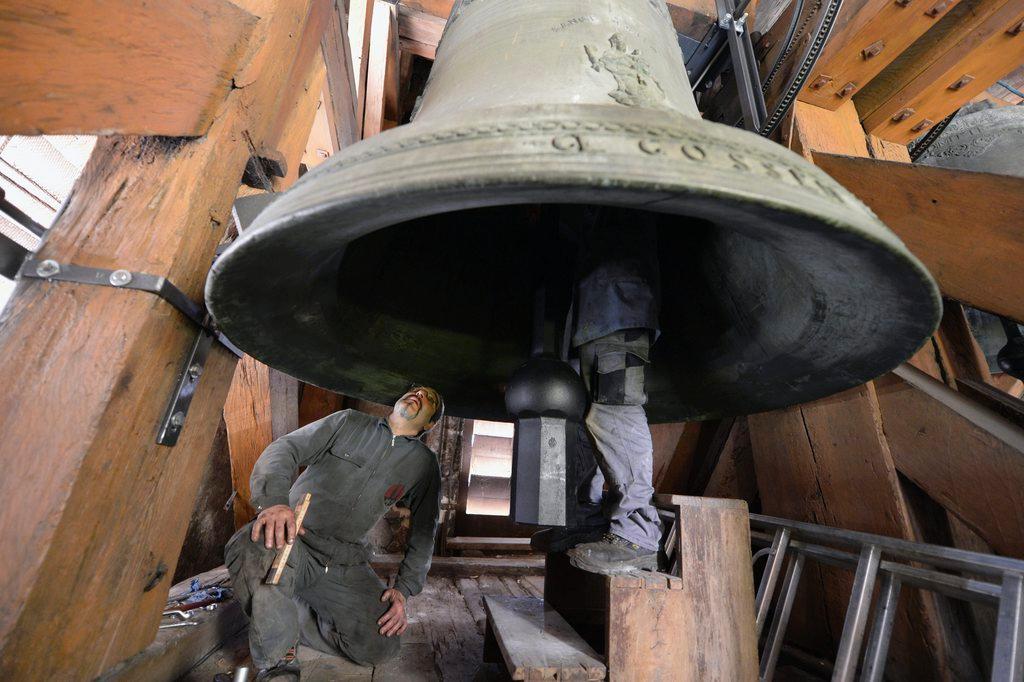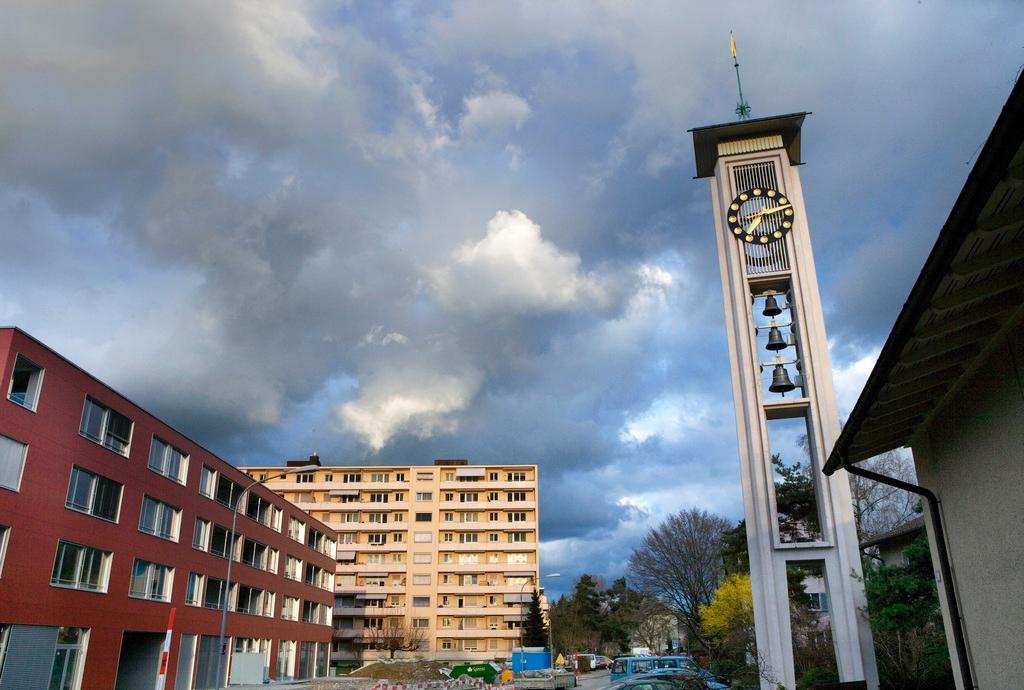Church bells charm and annoy their listeners

A cultural institution or a noisy nuisance? Switzerland’s church bells tell the time, call people to prayer, and irritate some of their neighbours – leading to disputes over whether they should be silenced. Some churches are bowing to public pressure and agreeing to reduce the volume or ringing hours.
On a recent Friday evening in Bern, every belfry was in action to ring in a late summer church festival. In a cacophonous chorus, the bells echoed throughout the old town for a full 15 minutes – attracting many listeners from outside the Swiss capital.
“For me it’s not noise but music. The church bells have different tones; it’s music to my ears,” as Dominik Däppen, a bell-ringer from the Lake Thun area, told swissinfo.ch. Yet he can understand those who are less enthusiastic, and suggested some ways to dim the perceived din.
“It would be possible to make them a bit quieter – either through insulation, like here at Münster Cathedral, or by changing the mechanisms or the clappers,” said Däppen.
In Germany, “many church towers are insulated with wooden or metal panels to absorb some of the sound”, according to Matthias Walter, president of the Swiss guild of bell makers and playersExternal link.
Walter told swissinfo.ch that Swiss bells aren’t necessarily louder than their European peers, but that the typical tower architecture – relatively open – might make them sound so.
Another key difference is the frequency of their ringing.
“In France the bells usually ring once per hour, and in Switzerland it’s normally on the quarter-hour – and again on the hour with another bell,” Walter said, noting that in Italy, it depends on the region. “In the north they tend to ring a bit more and there are more open towers.”
A health risk?
Four times per hour, 24 hours per day, is too much for LärmsensibleExternal link, an interest group that campaigns for a quieter Switzerland. Lärmsensible means “sensitive to noise” in German.
“Noise from church bells prevents people from falling and staying asleep at night. And this leads to stress that can make people sick,” Lärmsensible spokesman Samuel Büechi told swissinfo.ch.
So are church bells a health risk? Quite possibly, according to the Federal Office for the Environment, which has a section devoted to noise pollutionExternal link.
“There’s a good reason to believe that noise creates stress reactions, and stress leads to long-term health impediments,” Mark Brink, a psychologist and a scientific collaborator with the environment office, told swissinfo.ch. The federal authorities can regulate noise caused by traffic and industry, but they can’t tell the churches what to do.
“There are no explicit noise exposure limits for church bells at night. It’s a conflict that needs to be solved at the local level. But if possible, the ringing of church bells at night should be avoided. The less noise, the better; that’s always our position,” Brink said.
He added that a good compromise would be not ringing the bells between 10pm and 6am or 7am – something that many churches have already done. According to a survey in the Zurich-based Tages-Anzeiger newspaper, 15 out of 34 Protestant and 16 out of 24 Catholic churches in Zurich no longer ring their bells at night.
For example, earlier this year, the Evangelical Reformed church in the Zurich suburb of Höngg decided to silence its bells during the night. Parishioners approved the idea after there had been complaints among locals. Höngg’s Catholic church had turned off its night-time chimes some time ago, already.
“I’m quite convinced that the tradition of ringing church bells – at least in the night – will come to an end in five-to-ten years,” said Brink, who, incidentally, has always lived in places where he could hear church bells at night. “Parishes think it’s politically wiser to do this voluntarily rather than waiting for people to complain.”
Ding-dong
But if people object to the sound of church bells, why do they choose housing within earshot of them?
“There’s not enough quiet and affordable living space,” as Büechi explained. “It’s very difficult to find a quiet apartment, especially if you don’t have a car and don’t want to live far from a city centre.”
Many people don’t even think about church bells when apartment hunting, believes Walter. After moving in, they’re often surprised when they can hear them clanging at night.
According to Walter, there are two typical reactions: “Either they say, ‘Oh dear. That wakes me up but I’ll see how it goes.’ And then they get used to it after a couple of weeks and it doesn’t bother them.”
But the others decide that they’d better do something about it right away – which often includes unpleasant discussions and even legal action.
“Then of course the ringing bothers the person every time he hears it because it reminds him of the legal process,” Walter said.
Yet Brink says it’s important to remember that for a number of people, the church bells have a positive psychological effect.
“They feel better, they feel at home, they feel somehow that God is watching over them or whatsoever – so there’s a psychological meaning for those people. And this makes it a bit different than other types of noise.”
Court ruling: Tradition is important
Four cases regarding church bell noise have reached Switzerland’s Federal Court, which ruled in favour of the bells every time.
In one case involving the Evangelical Reformed church in Gossau in canton Zurich, the court dismissed the complaint from a local resident on account of an overriding public interest in maintaining the bell-ringing tradition. The plaintiff, who had settled next to the church thinking that the bells only rang on Sundays, took the case to the European Court of Human Rights in Strasbourg, France, in 2010. The case was declared inadmissible in December 2013.

In compliance with the JTI standards
More: SWI swissinfo.ch certified by the Journalism Trust Initiative




You can find an overview of ongoing debates with our journalists here. Please join us!
If you want to start a conversation about a topic raised in this article or want to report factual errors, email us at english@swissinfo.ch.